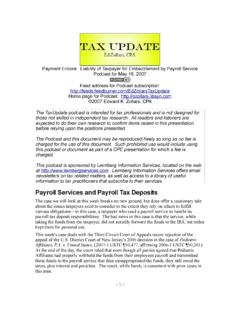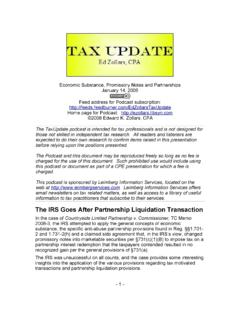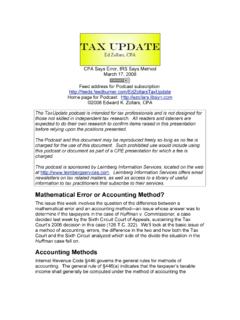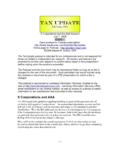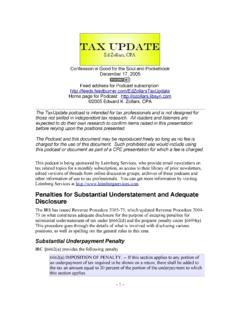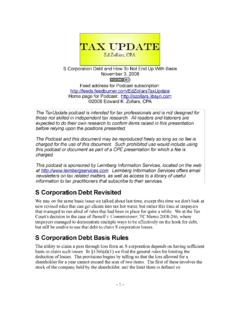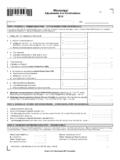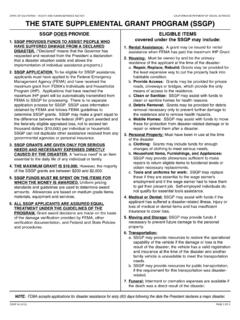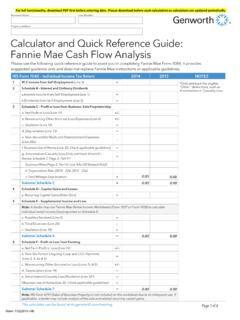Transcription of Qualified Joint Venture and Memo on Self - Ed …
1 Qualified Joint Venture and memo on Self-Employment Tax April 22, 2008 Feed address for Podcast subscription: Home page for Podcast: 2008 Edward K. Zollars, CPA The TaxUpdate podcast is intended for tax professionals and is not designed for those not skilled in independent tax research. All readers and listeners are expected to do their own research to confirm items raised in this presentation before relying upon the positions presented. The Podcast and this document may be reproduced freely so long as no fee is charged for the use of this document. Such prohibited use would include using this podcast or document as part of a CPE presentation for which a fee is charged.
2 This podcast is sponsored by Leimberg Information Services, located on the web at Leimberg Information Services offers email newsletters on tax related matters, as well as access to a library of useful information to tax practitioners that subscribe to their services. IRS Gives Analysis on Self-Employment Tax and Qualified Joint Venture We ve covered this topic before, both the original discussion of the point on the IRS s Tax Talk Today webcast/podcast and the correction that came up in the following presentation of that program. Now the IRS has released a legal memorandum that outlines the new improved IRS position on this matter.
3 To review, the key question is whether a married couple that elects to have their rental property treated as a Qualified Joint Venture under 761(f), does that convert the rental property s income into self-employment income and, perhaps, also convert rental losses into amounts that would offset self-employment income. The instructions to Form 1065 and the IRS discussion in the January Tax Talk Today indicated the answer was yes but the IRS later issued a modified version of the transcript of that presentation and specifically referred to that modified transcript in the following Tax Talk Today. Qualified Joint Venture and memo on Self-Employment Tax Podcast of April 22, 2008 Feed - 2 - The Law IRC 761(f) was added to the law last year to allow married taxpayers in some cases to not be required to file a Form 1065, but rather be able to report their Joint income from their Venture on the Form 1040 itself.
4 The section provides: (f) Qualified Joint Venture (1) In general In the case of a Qualified Joint Venture conducted by a husband and wife who file a Joint return for the taxable year, for purposes of this title-- (A) such Joint Venture shall not be treated as a partnership, (B) all items of income, gain, loss, deduction, and credit shall be divided between the spouses in accordance with their respective interests in the Venture , and (C) each spouse shall take into account such spouse's respective share of such items as if they were attributable to a trade or business conducted by such spouse as a sole proprietor. (2) Qualified Joint Venture For purposes of paragraph (1), the term " Qualified Joint Venture " means any Joint Venture involving the conduct of a trade or business if-- (A) the only members of such Joint Venture are a husband and wife, (B) both spouses materially participate (within the meaning of section 469(h) without regard to paragraph (5) thereof) in such trade or business, and (C) both spouses elect the application of this subsection.
5 As well, another provision was added to 1402 which is the cause of the controversy in question. That provision at 1402(a)(17) provides: (17) notwithstanding the preceding provisions of this subsection, each spouse's share of income or loss from a Qualified Joint Venture shall be taken into account as provided in section 761(f) in Qualified Joint Venture and memo on Self-Employment Tax Podcast of April 22, 2008 Feed - 3 - determining net earnings from self-employment of such spouse. The question that we end up having to resolve is this what, exactly, did Congress mean by the phrase notwithstanding the preceding provisions of this subsection in that provision does it solely refer to how allocate items of income that otherwise are determined to be self-employment income, or does it serve to effectively repeal the exceptions to the inclusion in self-employment income found elsewhere in 1402(a)?
6 The Form 1065 Instructions The initial view of the IRS, as expressed in the instructions to Form 1065 (which, as we know, is a wholly unofficial expression of position that is not binding on the IRS), was that this new provision did remove the exceptions found in 1402(a) or at least the one dealing with rental real estate income. The relevant provision, found in column 2 on page 2 of the instructions, provided: If you and your spouse make the election for your rental real estate business, you each must report your share of income and deductions on Schedule C or C-EZ instead of Schedule E. Although rental real estate income generally is not included in net earnings from self-employment, you and your spouse each must take into account your share of the income and deductions from the rental real estate business in figuring your net earnings from self-employment on Schedule SE.
7 Those instructions remain the ones posted on the IRS s website for Form 1065. On the Tax Talk Today show there was the following exchange per the transcript between Curt Freeman of the IRS and Elizabeth Buckingham, an enrolled agentwith Murray Wells Wendeln & Robinson CPAs in Dayton, Ohio: Can you clarify the application of self-employment tax to rental real estate activities by husband-wife Venture ? Will SE, will self-employed tax apply? Again. MR. FREEMAN: Yeah, I m not surprised somebody wanted a clarification because that s a strange twist to it, but that is actually what the law says. It says that they will compile it with their 1040.
8 If that election, what would be not subject to SE tax flowing through a 1065 is subject to SE tax on the two Schedule C s. MS. BUCKINGHAM: But it s interesting. As you said that, I was thinking about that s good if they have other Schedule C income, other self-employment income. Qualified Joint Venture and memo on Self-Employment Tax Podcast of April 22, 2008 Feed - 4 - MR. FREEMAN: Yeah, they re MS. BUCKINGHAM: They could use it as a reduction. MR. FREEMAN: Right. MS. BUCKINGHAM: Because generally, you re right. Rental real estate is usually a lot. I believe the last word in that transcript is wrong what she actually said (and what makes a lot more sense) is a a loss, referring to the fact that rentals tend to throw off losses.
9 On the same page as that original exchange, in a revised transcript the IRS posted the following clarification (which actually is pure and simple a total reversal of what was said in the transcript): While the profit (or loss) from a real estate rental trade or business operated by a husband and wife will be reported on two Schedule Cs if the spouses make a Qualified Joint Venture (QJV) election, neither making the QJV election nor reporting the profit (or loss) on two Schedules C converts amounts which are statutorily excluded from Self-Employment Contributions Act (SECA) tax into amounts subject to SECA tax. Similarly, simply electing to be treated as a QJV, and thereby reporting the real estate Joint Venture profit (or loss) on two Schedule Cs, does not convert the income or loss from passive to non-passive.
10 As I noted when I first posted about this change, the date on the transcript file indicates it was posted in the first week of March. IRS Gets More Formal in the Analysis This week the IRS made public a Chief Counsel Advice that was dated March 18th that more formally outlines the support for that position. Note that what we have still is not a binding document for those of us outside the IRS on this matter1, but it appears likely that the IRS plans to hold to this position at this point, at least unless Congress clarifies the section to make it clear they meant it to be handled the other way. More likely, I suspect, is that Congress will clarify 1402(a)(17) to clearly reflect this ruling since it was the Form 1065 instructions that surprised many of us.

